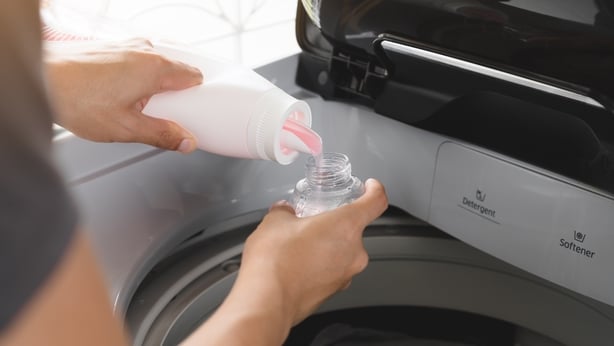Laura de Barra has built an online community through her "She.I.Y" tutorials and home renovation videos. However, an area that often gets overlooked in terms of sustainability and minding our possessions is what she calls "clothes longevity". Listen back above.
Getting the most out of your clothes, no matter how much they cost, can save you countless euros. Knowing how to do it correctly, however, is the key thing and that's where the Gaff Goddess herself comes in.
She joined The Ray D'Arcy Show to share her tips for avoiding wear and tear on our favourite items of clothing.

Having worked in the fashion industry for years, de Barra said she had picked up tips and tricks for preserving the quality of clothes. A key part of that, she added, is being aware of how fashion itself has changed in recent years.
"The main thing at the moment is our clothes are different to the generations before us. Our machines are different, we're washing with different temperatures, we're washing with different products, we're washing different fabrics and we're washing too much."
She added that "the perception of clean" is a driving force for this, that "to be clean you have to smell not like what the thing smells of, but of a chemical".
Cheaper quality material has led to weaker clothes, and despite being more susceptible to wear and tear, we still need to make sure we're not walking around in unclean clothes.
Fast fashion, although much maligned in sustainability discussions, is the only option for some people depending on budget or accessibility. Because of this, de Barra said, the focus should be on getting the most out of all clothes, regardless of price or quality. "Then, you'll buy less."

Washing too much is her first no-no. "If you must wash, low, low temperatures" are best for clothes, she said. "I know a lot of focus was on lower temperature washes with the price of how much a wash was going to be, but it's also much better for your clothes."
Fabric softener "is something we have to start ditching", she added. "People go crazy when I say this, but fabric softener is not good for the longevity of your clothes."
Fabric softener, she explained, was introduced because certain dyes were making the hand feel of fabrics harsh. It was brought into home products because we're not drying as much outside. "It's a coating that's over the fibers of the clothing", she said. "And if it's supposed to be flame resistant, it's affecting the flame resistant coating."
It also affects the absorption of clothing, which is needed to soak up sweat. When clothes are put into the wash, they're supposed to release these protein stains, which is stopped by the coating from fabric softeners.
She added that you can still use fabric softener if you like, but just be selective about what clothes you use it on. Delicate items and wool are the clothes that fabric softener is recommended for use on.
Naturally, de Barra has her own trick for keeping fabrics soft. Adding "a cup of vinegar to the rinse stage", she said, particularly with bed linen or towels, will keep fabrics soft, white and bright. And if you're afraid of smelling like a chipper, de Barra stresses that vinegar dries odorless.
For more tips and tricks, listen back to the full interview above.

